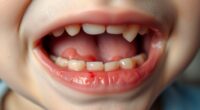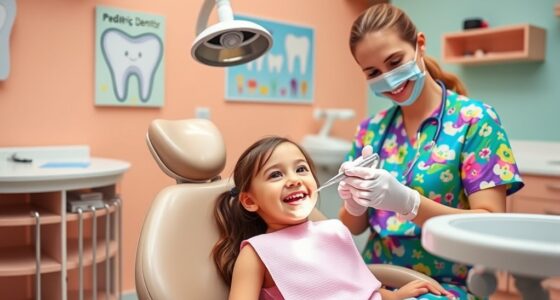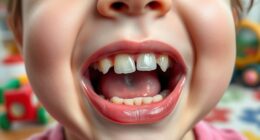You should take your child to the dentist by their first birthday or when their first tooth appears. Early visits help prevent cavities, teach good habits, and ease your child’s fear of dental care. Making these appointments fun and positive helps your little one feel comfortable and confident. If you keep going, you’ll find helpful tips on how to prepare your child and choose the right dental provider for lifelong oral health.
Key Takeaways
- The American Academy of Pediatrics recommends visiting the dentist by your child’s first birthday or when their first tooth erupts.
- Early dental visits help monitor teeth development, prevent cavities, and introduce oral care routines.
- Starting visits around age 1 helps familiarize your child with dental procedures, reducing future anxiety.
- Preventive care like fluoride treatments and sealants can be provided during these early visits.
- Choosing a child-friendly, experienced pediatric dentist promotes positive experiences and lifelong oral health habits.
Understanding the Ideal Timing for Your Child’s First Dental Visit
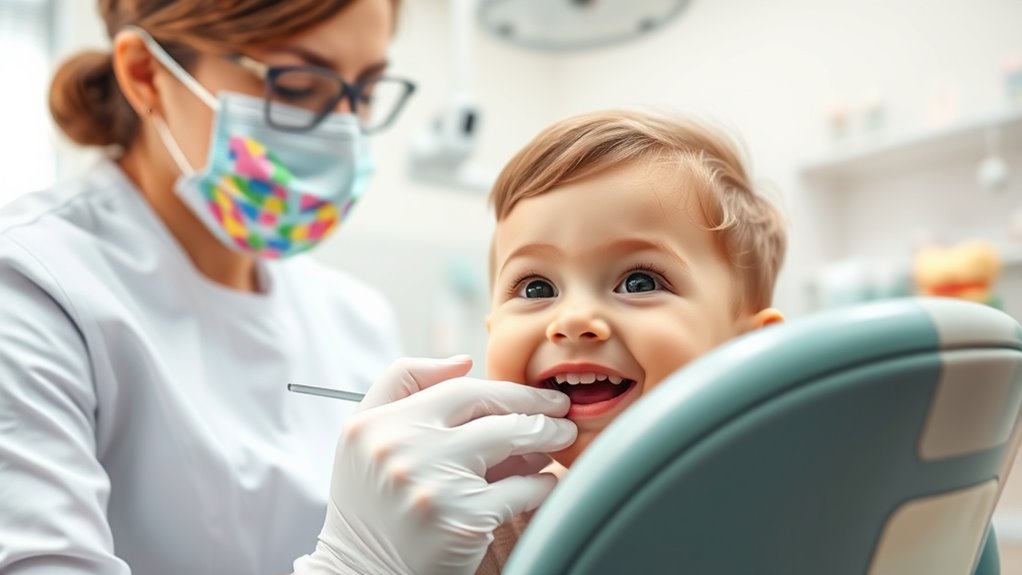
Understanding the ideal timing for your child’s first dental visit is essential for establishing a strong foundation for their oral health.
Starting early with your child’s dental visits builds a solid foundation for lifelong oral health.
The American Academy of Pediatrics recommends scheduling your child’s first dental appointment by their first birthday or when their teeth erupt. This early dental care allows you to monitor teeth eruption, identify potential issues, and set healthy habits from the start. Starting early also helps familiarize your child with preventive dental practices, making visits less intimidating and more routine as they grow. Additionally, early visits can include dental screenings that detect early signs of decay or other oral health problems, allowing for prompt intervention. Waiting until age four or later can increase the risk of untreated cavities and other oral health issues. Even if no teeth have emerged, a child’s first dental visit helps familiarize them with the dentist and ensures preventive guidance is in place. Furthermore, early visits can help educate parents on proper oral hygiene techniques tailored for infants and toddlers. Recognizing the importance of early dental visits can significantly improve long-term oral health outcomes for your child. Starting early supports your child’s oral health and sets the stage for a lifetime of healthy smiles through regular preventive dental visits.
The Benefits of Early Dental Care and Prevention
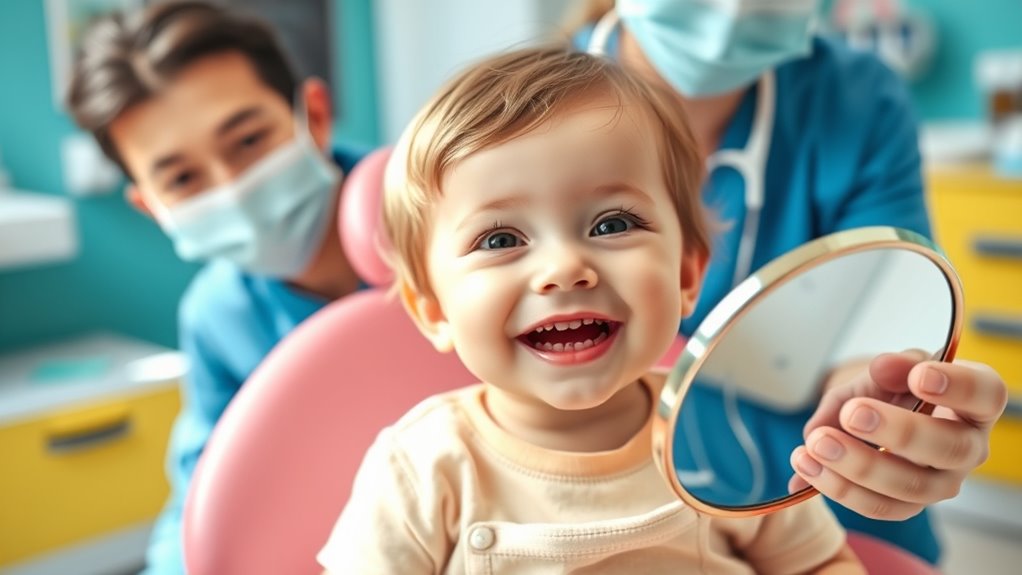
Starting dental visits early helps prevent cavities and other problems before they get worse. These visits also encourage your child to develop healthy habits that last a lifetime. Additionally, early visits can familiarize children with dental care tools and procedures, reducing anxiety during future appointments and promoting healthy habits from a young age. Learning about self watering plant pots can serve as a helpful analogy for consistent and effective dental care routines. Recognizing the importance of electric bike features can also help parents understand how to select suitable dental products for their children.
Prevents Future Problems
Early dental visits play a crucial role in preventing future problems by catching and treating issues before they become serious. Regular checkups allow you to identify signs of early decay and address them promptly, avoiding more extensive dental problems down the line. Cake pops can serve as a fun and engaging way to encourage children to look forward to dental visits when used as part of a positive dental routine. Preventive care starting before age one considerably reduces the risk of cavities and infections later in childhood. By establishing good oral health habits early, you set your child’s dental foundation for a lifetime of healthy smiles.
Additionally, early visits can help identify dental anomalies that may require special attention or intervention, ensuring comprehensive care from the start. Recognizing early signs of decay during these visits allows for less invasive treatments and promotes healthier development of your child’s teeth. Incorporating preventive measures such as fluoride treatments or sealants can further strengthen your child’s teeth and reduce future dental issues. Furthermore, understanding the importance of indoor air quality and maintaining a clean environment can contribute to overall health, including oral health, making regular dental visits even more beneficial.
Builds Healthy Habits
Introducing your child to routine dental visits early on helps establish lifelong healthy habits by making them familiar with proper oral care. When your child has their first dental visit, it sets a positive tone for future habits, emphasizing the importance of keeping their teeth clean. Early visits allow you to teach proper brushing and flossing techniques, creating a strong foundation for good dental hygiene. These regular checkups also help your child feel comfortable at the dentist, reducing fear and anxiety over time. Preventive care during early visits can reverse initial signs of decay, decreasing the need for extensive treatments later. Building these habits early supports overall health and encourages your child to develop a proactive attitude toward their dental well-being, setting them up for a lifetime of healthy teeth. Establishing consistent dental care routines early on can lead to fewer dental issues as your child grows. Additionally, introducing your child to preventive dental care early on helps minimize the development of cavities and other oral health problems.
What Happens During the First Dental Appointment
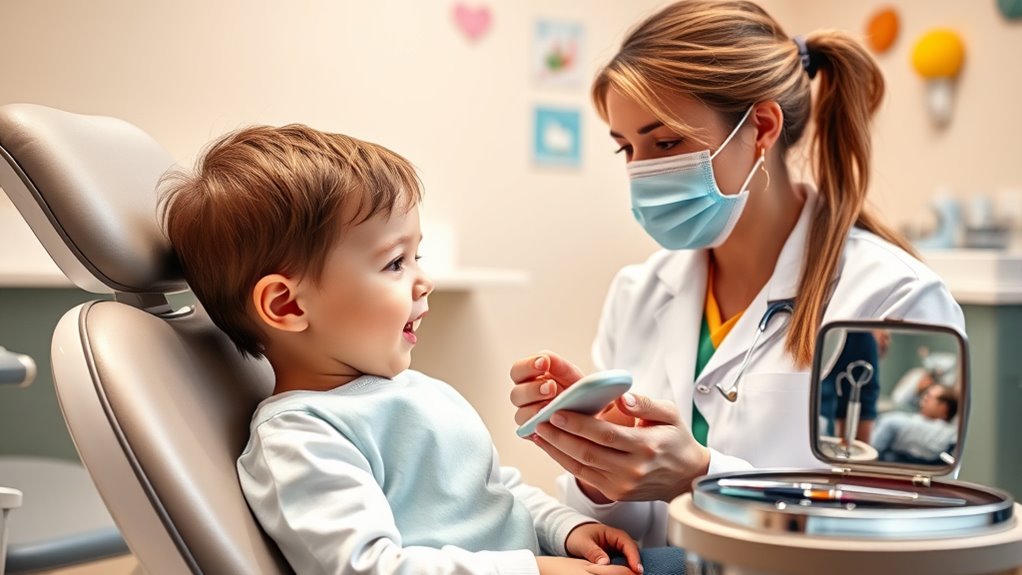
When your child visits the dentist for the first time, the dentist will examine their teeth, gums, and mouth for signs of decay or other issues. This initial visit is a child-friendly exam designed to establish comfort and familiarity with dental care. Here’s what to expect:
- The dentist will carefully examine teeth and gums to check for problems.
- They may clean the teeth gently and apply fluoride varnish to strengthen emerging teeth.
- The dentist will discuss proper brushing, flossing, and diet habits with you.
- You’ll have the opportunity to ask questions about oral health, teething, or thumb-sucking.
This visit helps set a foundation for healthy habits and ensures your child’s oral health is on the right track. Regular checkups also help monitor dental development and prevent future issues.
Preparing Your Child for a Positive Dental Experience
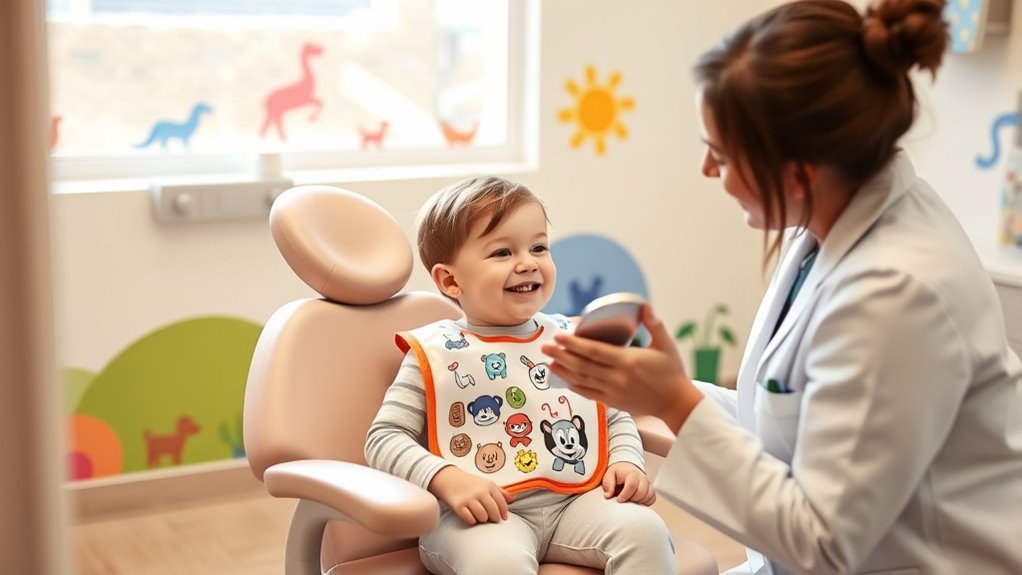
To help your child feel at ease, start talking about the dentist in a fun and positive way, using books or videos to introduce the idea.
Practice gently opening your child’s mouth at home so they become comfortable with the process.
Make sure the appointment happens when they’re well-rested and bring along a favorite toy to keep them calm.
Use Fun Talk
Using fun talk can make your child’s first dental visit feel like an exciting adventure rather than something to fear. Start by using positive language and age-appropriate books or videos about visiting the dentist. This helps your baby understand oral care as a natural part of growing up.
A new sentence with celebrating milestones and the rest of the sentence.
- Talk about the visit as a special outing, emphasizing rewards like stickers or small toys.
- Practice gentle mouth opening and tooth brushing at home to boost confidence.
- Schedule the visit when your child is well-rested and not hungry for a smooth experience.
- Frame the appointment as a fun story, making the dentist seem like a friendly helper for children’s health.
Using fun talk encourages a positive attitude toward dental visits and helps your child develop healthy habits early.
Practice Opening Mouth
Introducing gentle mouth-opening exercises early on can make your child more comfortable with dental visits. Starting around age 1, practice opening their mouth gently at home to familiarize them with the sensation of oral care. Use toys or mirrors to make it fun, encouraging cooperation during mouth opening exercises. Monitoring sleep patterns can also help ensure your child is well-rested and less irritable during dental visits. Gradually introduce a toothbrush or finger brush to help your child get used to oral handling, which is essential for maintaining healthy baby teeth and overall oral health. Simulating a dental exam by softly touching their teeth and gums, making them familiar with the feeling of a dental checkup. Developing trust and familiarity with dental routines early on can significantly reduce anxiety during visits. Additionally, understanding practical support for seniors can be helpful if family members require assistance with health routines, including dental care. Incorporating professional dental services can ensure your child receives comprehensive dental evaluations and personalized care. Building early dental health habits is key to establishing a positive attitude toward dental care, making the first dental visit less intimidating and more about establishing good habits for a lifetime of healthy teeth.
Choosing the Right Dental Provider for Your Little One
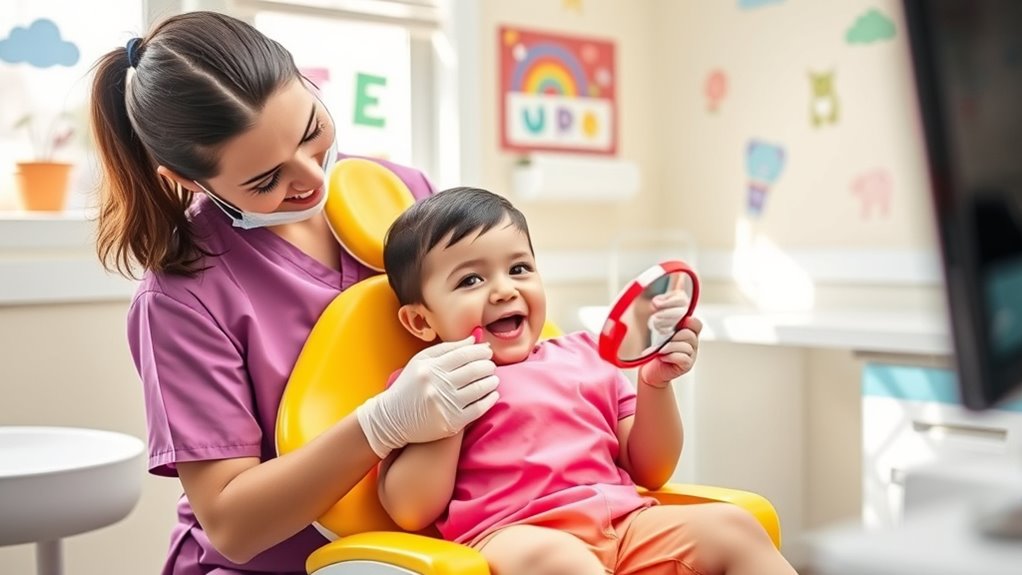
Choosing the right dental provider for your little one can make a significant difference in their oral health experience. A pediatric dentist has specialized training to handle children’s unique needs, making their first dental visit smoother. You are trained on data up to October 2023. Consider these key points: 1. Look for a pediatric dentist with a child-friendly environment that makes visits less intimidating. 2. Ensure the provider is experienced in early dental care, focusing on teeth and gums development. 3. Check if staff are trained to manage behaviors like fear or limited cooperation during appointments. 4. Choose someone who emphasizes children’s oral health and preventive care from the start. Establishing positive habits early can also set the stage for understanding the importance of dental health education, helping your child maintain healthy teeth and gums throughout their life. Building trust and comfort during visits encourages children to be cooperative and less anxious about future dental appointments. Opting for a pediatric dentist helps establish positive habits early, setting the foundation for lifelong dental health.
Resources and Tips for Maintaining Your Child’s Oral Health

Starting your child’s oral health routine early sets the foundation for a lifetime of healthy smiles. Schedule their first dental visit by their first birthday or when their first teeth erupt, whichever comes first.
Begin your child’s oral health journey early for a lifetime of bright, healthy smiles.
Use resources like the First Tooth, First Birthday, First Visit Fotonovela, and educational videos to prepare both yourself and your child. Establish a consistent oral care routine at home, including brushing with fluoride toothpaste as teeth appear and flossing once teeth touch.
Find a child-friendly dentist through tools like Find-A-Dentist to ensure a positive experience. Prepare for appointments by practicing opening your child’s mouth, explaining what to expect, and framing visits as fun adventures.
Implementing dental automation technologies can help monitor your child’s oral health and remind you of upcoming appointments, making it easier to stay on top of their dental care. These tips and resources support your child’s dental health and encourage good habits from the start.
Frequently Asked Questions
What Age Is Best for a First Dental Visit?
You might wonder about the best age for your child’s first dental visit. Experts recommend scheduling this visit by their first birthday or when their first tooth appears, usually around six months.
Early dental checkups help monitor tooth development, prevent decay, and instill good oral hygiene habits.
When Should a Child Have Its First Dental Appointment?
Think of your child’s teeth as tiny jewels that need early protection. You should schedule their first dental appointment by their first birthday or when their first tooth appears.
This early visit helps catch cavities and habits that could harm their smile later. Don’t wait too long—delaying can let problems grow unnoticed.
Starting routine dental checkups early sets the stage for a lifetime of healthy, happy smiles.
When Should a Child Get Their First Teeth Cleaning?
You should schedule your child’s first teeth cleaning around their first birthday or when their first tooth appears. Early cleanings help remove plaque, prevent cavities, and establish good oral hygiene habits.
Dentists use gentle tools and may include fluoride treatments to strengthen enamel. By starting routine cleanings early, you’re setting your child up for healthy teeth and gums, making dental visits a normal and positive part of their lifelong dental care.
At What Age Can a Child See a Regular Dentist?
You might think your child is too young for a regular dentist, but most children can see one by age 2 or 3 if there are no specific concerns. Early visits help monitor development and catch issues early.
Starting at age 1 is ideal, but once your child is a toddler, establishing a routine with a general dentist helps build comfort and promotes lifelong oral health.
Conclusion
Starting dental visits by age one can considerably reduce future cavities and dental issues. Did you know that children who visit the dentist early are 40% less likely to develop cavities? Regular check-ups not only prevent problems but also help your child develop a positive attitude toward oral health. By choosing the right provider and maintaining good habits, you set your little one up for a lifetime of healthy smiles. Don’t wait—early care truly makes a difference!

